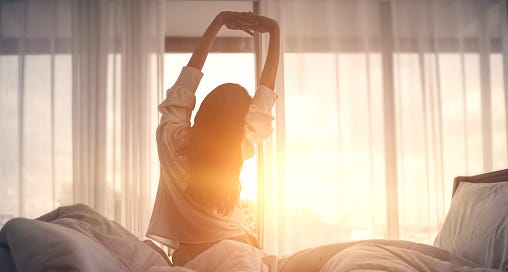Science Backed Tips That Will Help You Sleep Better
TL;DR: Sunlight, Magnesium, Yoga, and NO Melatonin
Estimated Reading Time: 2 minutes and 25 Seconds
Dr. Andrew Huberman is a neuroscientist and tenured professor in the Department of Neurobiology at the Stanford University School of Medicine.
Huberman hosts a podcast called Huberman Lab which covers a variety of different topics surrounding health and wellness. Topics include, “How to improve happiness”, “Improving your memory”, and “Improving focus”.
Here’s a list of his 6 tips for getting better sleep with links to the podcast clips associated with each:
2–10 Minutes of Early-Morning Sun Exposure
“The simple behavior that I do believe everybody should adopt… is to view, ideally sunlight, for 2–10 minutes every morning upon waking. So, when you get up in the morning, you really want to get bright light into your eyes because it does two things. First of all, it triggers the timed release of cortisol, a healthy level of cortisol, into your system, which acts as a wake-up signal and will promote wakefulness and the ability to focus throughout the day. It also starts a timer for the onset of melatonin.”
Take Magnesium Threonate, Theanine, & Apigenin
“That cocktail of 50 mg of apigenin, 300–400 mg of magnesium threonate or bisglycinate, and 200–400 mg of theanine, for me, has been the best way to consistently fall asleep quickly and stay asleep most if not the entire night, which, for me, is about 7–8 hours.”
Here’s why:
Try Yoga Nidra — It Facilitates Relaxation, Making It Easier to Fall Asleep
“There was this lure in the yoga nidra community that 30 minutes of yoga nidra is equivalent to 4 hours of sleep. Frankly, I don’t think there’s any evidence for that specific statement. But when I started doing this practice and exploring it, I found that I would come out of a 30-minute yoga nidra session feeling like I slept 5, 6 hours or longer.”
Don’t Wear Blue Light Blocking Glasses During the Day
“You want a lot of blue light early in the day, so wearing blue blockers early and throughout the day is exactly the wrong approach to setting your circadian clock properly. People have just decided blue light is bad, and nothing could be further from the truth … [However], blocking blue light later in the day — meaning between 10 PM, probably even 9 PM, and 4 AM — is going to be beneficial.”
And finally, on those nights where you just can’t seem to fall asleep no matter what you do…
Supplement With 1 g of GABA & 1 g of Glycine
“If you ever really need to sleep… 1 gram of GABA and 1 gram of glycine in combination, that’s more of a heavy hit over the head, but if you’re having a hard time getting to sleep, that can help. I don’t recommend people take those chronically.”




